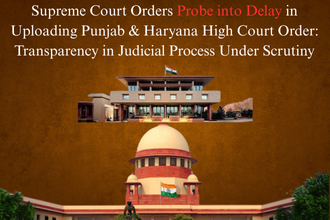In a landmark event for the Indian legal landscape, Chief Justice of India (CJI) Sanjiv Khanna underscored the transformative role of mediation in dispute resolution during the National Mediation Conference 2025, which also marked the launch of the Mediation Association of India. Held on May 3, 2025, the event gathered legal luminaries including the President of India Droupadi Murmu, Union Law Minister Arjun Ram Meghwal, Supreme Court Justice BR Gavai, Attorney General R Venkataramani, and Solicitor General Tushar Mehta.
Mediation: A Holistic and Humane Alternative to Litigation
In his keynote address, CJI Sanjiv Khanna emphasized that mediation should not be seen as a lesser form of justice. Instead, it must be recognized as a wiser, more human-centered mode of resolving disputes. Drawing a sharp contrast with conventional courtroom litigation, CJI Khanna observed that while court cases often produce a winner and a loser, mediation strives to resolve disputes by addressing the root causes, preserving relationships and fostering mutual understanding.
“Mediation is not a lesser form of justice; it is a wiser form of justice,” said CJI Khanna. “It heals, restores, and offers a more humane resolution.”
The Numbers Speak: 7.57 Lakh Cases Settled via Mediation Since 2016
Highlighting the growing relevance of mediation, the CJI noted that 7.57 lakh cases had been resolved through mediation between 2016 and early 2025. However, he acknowledged that mediation is yet to permeate rural India, which remains largely unfamiliar with its benefits.
Why Mediation Matters: Justice Beyond Legal Victory
CJI Khanna elaborated on how mediation offers nuanced, empathetic solutions, especially in situations where the conflict arises from misunderstandings or shared fault. Unlike rigid courtroom proceedings, mediation is flexible, personalized, and non-adversarial.
“Often disputes exist in shades of grey. Mediation undoes complexities and avoids rigid legal and procedural frameworks,” he noted.
Launch of the Mediation Association of India: A New Era Begins
The Mediation Association of India was officially launched during the event as a national-level body that aims to institutionalize mediation across India. The association will bring together:
- Professional mediators
- Mediation trainers
- Law firms and advocates
- Civil society organizations
- PSUs and corporates
- Academic institutions
- Government representatives
The goal is to promote mediation as a primary, not secondary, means of conflict resolution.
President Droupadi Murmu: A Return to India’s Dispute Resolution Roots
President Droupadi Murmu, who was present at the event, recalled India’s rich legacy of out-of-court settlements, especially through the Panchayat system. She lamented that colonial rulers disrupted this indigenous tradition, replacing it with a more adversarial legal system.
“Panchayats were pillars of social harmony. Mediation is a return to that legacy,” said the President. She emphasized the need for village-level empowerment to ensure disputes are resolved at the grassroots, minimizing court congestion.
Justice BR Gavai: Mediation Must Be Part of Legal Education
Justice BR Gavai called for the integration of mediation into law school curricula, beyond the theoretical study of the Mediation Act, 2023. According to him, soft skills like empathy, emotional intelligence, and active listening are as important as legal acumen.
“Mediation is a human process,” he said. “Law students should be equipped with the emotional tools needed to resolve conflicts.”
Union Minister Arjun Ram Meghwal: Mediation Deeply Rooted in Indian Epics
Union Law Minister Arjun Ram Meghwal highlighted that mediation is *deeply rooted in Indian culture, referring to the *Ramayana and Mahabharata as early examples of mediation practices.
“Angad was a mediator in Ramayana, and Lord Krishna in Mahabharata. Today, we have a mediation law to continue that legacy,” he said, referring to the Mediation Act, 2023, which provides a comprehensive legal framework for mediation in India.
Attorney General R Venkataramani: Celebrate May 3 as National Mediation Day
In an inspiring suggestion, Attorney General R Venkataramani proposed that May 3 be commemorated as *India’s National Mediation Day. He envisioned a future where *India becomes a global hub for mediation, with the Mediation Association leading the charge.
“Today is a beginning. May this awakening lead us to a new era where India becomes the headquarters of a Global Mediation Association,” he said.
Solicitor General Tushar Mehta: Fast-Track Disputes via Mediation
Solicitor General Tushar Mehta stressed the importance of utilizing mediation, particularly for *small-scale disputes, labor issues, and *commercial disagreements that don’t always require prolonged litigation.
“The Mediation Association can ensure that disputes are resolved quickly, flexibly, and fairly,” he said.
The Mediation Act, 2023: Legal Foundation for a Mediation-Driven Future
The newly enacted Mediation Act, 2023 was frequently referred to throughout the event. It fills a long-standing gap by offering a dedicated statutory framework for mediation, which was previously governed by fragmented provisions in various laws. The Act ensures:
- Confidentiality of proceedings
- Enforceability of mediated settlement agreements
- Creation of mediation councils
- Training and certification of mediators
- Online and community mediation access
Conclusion: A Turning Point for Dispute Resolution in India
The National Mediation Conference 2025 and the launch of the Mediation Association of India mark a turning point in India’s justice delivery system. With top constitutional functionaries and legal experts rallying behind mediation, the message is clear—mediation is not an afterthought but a core pillar of modern justice.
As India takes steps toward reducing its litigation backlog and making justice more humane, mediation stands out as the future of conflict resolution. With institutional support, public awareness, and cultural resonance, mediation may soon become not just an option, but the first choice for resolving disputes.


